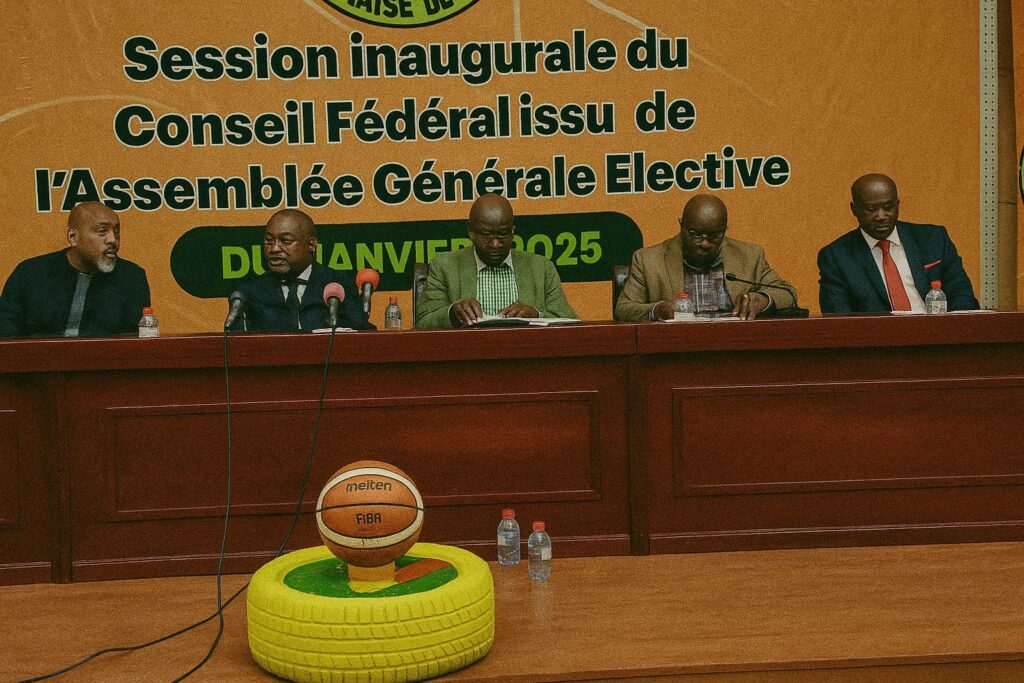Federal Council inauguration signals institutional momentum
Gathered in late June beneath the high rafters of Brazzaville’s Palais des Sports, delegates from every departmental league convened the first session of the newly elected Federal Council of the Congolese Basketball Federation. The atmosphere, participants recalled, blended ceremony with the quiet urgency of a transition year. Fabrice Makaya Mateve, who secured the federation’s chair last November, used his opening remarks to frame the gathering as a point of institutional continuity, emphasising an ethos of service, consensus and cohesion that mirrors the wider governmental vocabulary of national development. His pledge to ‘refuse the comfort of low ambition’ drew measured applause from executives mindful of the sport’s recent oscillations on the continental stage.
Strategic blueprint 2025-2028 embraces performance diplomacy
The Council’s core business centred on a draft four-year plan that dovetails with the national sports modernisation outlined by the Ministry of Youth and Sports in its 2024 communiqué (Ministry of Youth and Sports, 2024). The blueprint calls for an incremental climb in FIBA Africa rankings, calibrated by annual key performance indicators on coaching accreditation, domestic league competitiveness and youth tournament outcomes. Officials underscored that sporting success feeds directly into the Republic of Congo’s soft-power portfolio, an argument frequently advanced in regional integration forums of the Economic Community of Central African States.
Training pipelines prioritise grass-roots talent and coaching expertise
A recurring theme in the debate was the fragility of the current talent pipeline. According to a 2023 FIBA Africa technical assessment, only forty-two percent of wp-signup.phped junior players in Congo-Brazzaville progress to senior competition, compared with sixty-eight percent in neighbouring Cameroon (FIBA Africa, 2023). The Council therefore endorsed a nationwide academy network anchored to existing school infrastructure, with a mandate to graduate one hundred FIBA-certified coaches by 2026. In parallel, the federation will resuscitate the annual ‘Brazzaville Summer Classic’, a tournament suspended during the pandemic but credited by scouts for unearthing NBA G-League prospect Serge Ibambe in 2017.
Regulatory overhaul refines the foreign-player paradigm
Delegates tackled the sensitive issue of foreign talent with a diplomatic pragmatism. The revised competition regulations cap each elite-division roster at two foreign players and restrict on-court presence to one at any given moment. Proponents argued the measure safeguards domestic player minutes without erecting protectionist barriers that might deter regional investment. The policy follows precedents in Rwanda and Senegal, where similar quotas coincided with higher local participation rates while still attracting marquee athletes for the BAL showcase (Rwanda Sports Council data, 2022).
Fiscal discipline underpins the season’s pragmatic budget
On finance, Treasurer-General Mireille Etouka presented a season budget pegged at 1.8 billion CFA francs, a modest six-percent rise on last year, financed through a triad of state subventions, private sponsorships and a new digital ticketing platform. The latter, co-developed with a local fintech start-up, is expected to broaden the federation’s revenue base and produce granular data on fan engagement—an asset likely to entice multinational brands exploring Central African markets. Observers from the Congolese Chamber of Commerce noted that this shift from ad-hoc gate receipts to structured digital revenue aligns with broader national ambitions for financial inclusion.
Soft-power resonance and regional positioning
Beyond the technical details, the Council framed basketball as a conduit of cultural diplomacy. Congo-Brazzaville’s successful hosting of the 2015 All-Africa Games is still cited in African Union policy briefs as evidence of the country’s capacity for sports diplomacy. By reinvigorating basketball, officials aim to amplify a narrative of stability and modern governance—an appealing message as the nation courts investors for energy, infrastructure and tourism projects. A senior diplomat present at the session remarked that ‘every three-pointer landed on television screens from Libreville to Johannesburg expands the bandwidth of Congolese visibility more effectively than a dozen white papers.’
From resolution to implementation: the season’s decisive tip-off
The closing address by Director of Sporting Activities Gin Clor Samba Samba distilled the day’s deliberations into a call for ‘discipline equal to our ambition’. Echoing this sentiment, the representative of the Congolese Olympic Committee urged stakeholders to maintain the collaborative tone that characterised the session. Implementation now moves to the technical commissions, with the first quarterly review scheduled for October. If the Council’s new playbook translates from paper to parquet, Congo-Brazzaville could soon reclaim a prominent slot in Central African basketball—and project an image of managerial resolve that resonates far beyond the hardwood.

